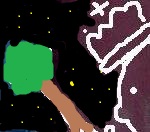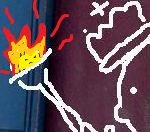Full Disclosure: Met Howe at this year’s Sabotage Awards on a panel regarding the Culture of Criticism. Review copy provided by Vintage Books.
Review: Loop of Jade is Howe’s first collection, in part an account of the poet’s journey to Hong Kong and China to learn about her and her mother’s past, in part a set of imaginative lyric adventures taking in Kung Fu-tzu, Pythagoras, Titus Andronicus, LA Confidential, Cormac McCarthy and Chinese political blogging, amongst others. I’ve slated writers before for wielding their education like an overseer’s whip; Howe’s poems are close-read and empathetic explorations into each text that recognise their value as real-world artefacts above and beyond their capacity to bestow literary authority. The giddying breadth and scope of attention the book achieves is held together by Howe’s calm-but-engaged, precise-but-emotionally-present narrative voice, its open-minded, casually unshakeable dedication to presenting uncomfortable and occasionally devastating stories and ideas, turning them to the light and making them shine. Loop of Jade also features some of the most sure-footed long-line narrative poetry I’ve read: she’s up there with Longley for loading up a line and keeping it airborne.
RHAPSODISING MUCH. So that para’s an attempt to get to the heart of a book with so many overlapping ideas and interwoven narrative strands (the epigraph is from Borges, for pete’s sake) it’s hard to know where to begin. The Borges poems, concerning ‘a certain Chinese encyclopedia’ and its weird classifications of animals, form the a kind of formal backbone and a kind of parallel stream to the book’s more historical-biographical (or geographical) work, as themes and ideas from one overflow into the other. The overriding sense is being taken on a strange and unpredictable journey by someone who knows exactly where they’re going. If you’ve the time I’d recommend reading Howe’s diaries for Best American Poetry, both for its insights into the book’s themes and a straight-up fascinating bit of travel writing.
The book’s opening and title poems both concern Howe’s mother, so I think it makes sense to start there. ‘Mother’s Jewellery Box’ is the first of several short-lined, impressionistic lyrics that act as breathing spaces between the more narrative-intense poems. This one is kind of a way in to the book, an exercise in seeing the way the book sees, magnifying the poem’s small, shining things and drawing them together with ‘lupin seeds’ and ‘horseflies’ eyes’ as items of equivalent worth. A sceptical reader might be put off by the poem’s niceties, even kitschness; the poem serves as an important bridge from the everyday to the collection’s special worlds, and the poem’s ostensible free-floatingness alters drastically as its images gather meaning across the book.
The poem ‘Loop of Jade’ itself is just incredible. Gunna put that out there. It’s an astonishing piece of writing, an intimate portrait of Howe’s mother, her life, her habits of speech, her struggle to speak and to be understood when she does; also, quietly, the poet’s own feeling of distance from the roots of these qualities: ‘like watching her wade, one dredged step at a time, out into a wide grey strait – myself a waving spot, unseen, on the furthest shore’. One of Howe’s great skills, I think, is maintaining a precise, almost disinterested narrative tone, to the extent that when a disturbing detail appears, its delivery in that same unflinching voice makes it all the more stark. So when she relates her mother’s story about her childhood tenement building, its communal toilet beside its communal kitchen, the impact on the reader’s imagination is visceral:
‘How despite themselves her eyes would follow to the nearby drain, as it sprouted – here she giggles, shivers – the glistening bodies
of cockroaches, like obscene sucked sweets.’
And this is another great ability, to house two apparently conflicting but wholly coherent details in the same lyric space; it would be easy to say the cockroaches were just horrifying, or kind of funny, but by doing both the mother’s perseverance and relief are both recognised and respected, two aspects of one response. Elsewhere in the poem is a long consideration of her mother’s speech patterns, a hesitancy implicitly prompted in part by her traumatic childhood and partly by her foreignness to the English language:
‘in her early forties, in a new country, she spoke more slowly than now, and with a subtle, near-constant nasal hum, more of a nnnnnng – so natural to Cantonese –
but which filled the gaps between her otherwise fluent English like the Thereminy strings in a Mandarin film score.’
The poem also puts the reader in the mother’s shoes (and it’s worth noting that Howe notes the strangeness of the word ‘mother’, only using it ‘at an immigration office, perhaps, to total strangers, or inside the boundaries of a poem’), by setting part of it in her voice; the section enacts these hesitations formally, challenging the reader to keep pace with hers, to render a physical voice on the page. It’s an unassumingly beautiful moment, and noticeable that humming itself is a recurring feature of the poems, like the cicadas in ‘Pythagoras’ Curtain’, the factory machines in ‘Faults Escaped’. The concluding section brings the jewellery of the title into focus, a bracelet blessed to protect the child wearer. The closing line manages to be both heartbreaking and clear-eyed, an acknowledgement of her mother’s faith and a sincere questioning of it. It’s too powerful to spoil here.
PHEW right, believe it or not there are other poems in the book. Like I said up top, Loop of Jade consists largely of unusual, often pretty funny, lyric adventures, often with a fable-ish sting in the tail. Which all sounds rather tame, but taken en masse the poems have a genuine bite behind the calm, articulate front. Take ‘Embalmed’ (a poem with an epigraph from Chairman Mao about the mass murder of scholars) in which the smell of the thoroughly mortal Emperor’s rotting corpse is masked by piles of fish, or ‘Innumerable’, a deeply powerful piece about attending race day at Hong Kong’s Royal Jockey Club in the aftermath of Tiananmen Square:
‘On rainy race days the turf workers, still bamboo-brimmed, would wear transparent macs dotted with drizzle and the determination of a search party. Where they pressed the clumps back down, you would never know.’
On their own, they are strong pieces; the latter particularly conveys a powerfully empathetic political message through image alone. Over the course of the collection, this facility for conveying radically challenging political thought (note the implication of contemporary Britain in the Jockey Club’s ‘Royal’ moniker; caustic governmental policy is not a foreign concept, and for more on Britain’s history of economic violence against China, read Howe’s essay on Jardine, Matheson and the opium trade) almost subliminally is one of the book’s great strengths. Power structures are noted and critiqued, the poet’s own position as authority is constantly under scrutiny; ‘Sirens’, a poem that redresses the poet’s misunderstanding of a line from Roethke (and when did you last read a poem where the poet so enthusiastically acknowledges their fallibility?), also addresses the misconceptions and potential abuses of the elder poet’s relationship with his student:
‘A tutor watches a girl click-to the door
of his study with reverent care, one winter evening –
And understands Horace on reining in fantasy.’
An awareness of one’s power over someone is one thing, refusing to exploit that power quite another. The poem lets no poet off the hook.
A struggle to find a voice, or means of expression, also appears repeatedly. The beautifully measured ‘Having just broken the water pitcher’ begins with a provocation from 13th century Chinese scholar Wumen Huikai: “If you cannot call it a water pitcher, what do you call it?” The poem then reads into the developmental similarities of kanji script and the punning that allows Chinese bloggers to circumvent official censure:
‘He ponders how strange it is (how useful…) […]
that sensitive words (as in filters,
crackdowns) sounds exactly like breakable
porcelain. Done typing, he clicks Submit.
Recall the old monk’s koan, the correct
reply to Master Baizhang’s question:
His pupil kicked over the pitcher and left.’
An apparently absurd or childish gesture can point towards a resetting of the terms of debate, a radical rethink of the question, or of the system of power that poses it. Similarly, the single densely packed sentence of ‘Banderole’ takes in the act of providing a voice to a character in a painting. The ‘boot-faced shepherd’ in the face of heavenly glory is granted ‘a Latinity beyond / his own lacked letters’ by a ‘tawny scroll’s / unfurling coil’. The artist giving their subject an inauthentic voice is as important to the poem as the act of making the ‘mute canvas speak’: the act is only partly a failure, only partly a success. See also ‘That from a long way off look like flies’, in which a dead midge squashed in a book becomes ‘a glyph in a strange alphabet’. The poem features perhaps my favourite line in Shakespeare, Titus Andronicus’, ‘how, if that fly / had a father and a mother?’ The play intends this as evidence of Titus’ ill mental health; the poem, in the line ‘At empathy’s darkening pane we see / our own reflected face’ suggests the act is not so very unusual, that it in fact requires far more conscious empathetic effort than simply ‘scrap[ing] her off with a tissue’ (note the personal pronoun), confronting the difficult what ifs of our activated mirror neurones.
There’s a lot to admire in Loop of Jade: its surprising angles and insight woven into a warm and careful register, its acknowledgement that kindness and care are subversive political acts, its determination to foreground humanity wherever possible, even in the face of great cruelty. ‘Stray Dogs’’s account of Ezra Pound’s imprisonment in custody of the Allied forces manages to focus on a thoroughly human need to exercise his mind without losing sight of his own acts of racist violence. The poems’ formulae are never simple. Nowhere is this clearer than in Howe’s poems about home, her physical pilgrimages (see Raleigh’s ‘give me my scallop shell of quiet’, referenced twice in the collection) and empathetic journeys. Always at arm’s distance to the place she spent her early years, she is at pains to do it justice on its own terms, to get her own self, her own ego (though there are few books where that word is less appropriate), out of the picture. The closing poem, ‘Yangtze’, ends with the image of the forest ‘persisting’ under the surface of the Yangtze river, the trees’ ‘Roots rot deep in the hill / where buried rock / is still dry’:
‘Windows film,
doors drift open
in the empty concrete
shells of houses
towns that once
held hundreds
of thousands
slowly filling with
what, what is it
they fill with?’
The book asks direct questions only infrequently, often in moments of rhetorical intensity like this one, where the submerged city becomes a reflection of loss, of lost home, a lost ability to belong to a geographical place, even the poet’s ability to accurately describe it is ultimately out of reach. It’s a perfectly fitting end to a book that refuses simple answers to complicated questions.
Tl;dr: Absolutely read this book, several times and slowly. I hope it gets the attention it deserves, and, unless there’s a truly spectacular work in the Forward list I haven’t read yet, must be a strong contender.



Reblogged this on maryrosesmyth.